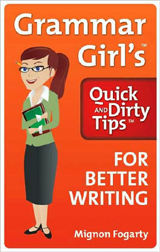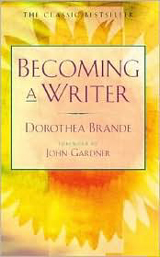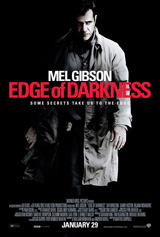 Launched two years ago in the summer of 2006, Grammar Girl’s Quick and Dirty Tips for Better Writing currently ranks thirty-second among iTunes’ top podcasts. Capitalizing on this success, creator Mignon Fogarty has authored a book that explains grammar, punctuation, and usage to the language layperson with gentle humor and accessibility.
Launched two years ago in the summer of 2006, Grammar Girl’s Quick and Dirty Tips for Better Writing currently ranks thirty-second among iTunes’ top podcasts. Capitalizing on this success, creator Mignon Fogarty has authored a book that explains grammar, punctuation, and usage to the language layperson with gentle humor and accessibility.
The subject-verb agreement error on the back cover (“Written with the same wit, warmth, and accessibility that draws people to the podcasts …”) demonstrates how easy it is for anyone to make an error and is just the type of mistake that Fogarty would correct not with cattiness but, well, “wit, warmth, and accessibility.”
Using cute illustrations of sidekicks Squiggly and Aardvark, Fogarty explains concepts clearly with limited jargon, clarifying the rationale behind rules before providing the “quick and dirty” memory tricks for which her podcast is known. Some of the material covers familiar terrain—the difference between “its” and “it’s,” for example—and the book will serve as a handy desk reference for reminders on such sticky subjects. Grammar Girl is also worth reading cover-to-cover, however, for the topics you might not ever think to look up—like that it’s actually grammatically correct to say, “I’m good.”
On tougher questions, Fogarty mines multiple sources before coming to a conclusion. She generally sticks to standard usage but recognizes that language evolves. She goes too far, however, when she encourages her readers to use they and their as singular pronouns:
When a child misbehaves, they should be punished by their parents.
Using he or she and his or her may be awkward, but using they/their will only cause your reader to question whether you know the rule, even if you’re applying it incorrectly on purpose. (Indeed, Fogarty doesn’t recommend it in formal writing.) The best thing to do—and what the author advises for this and other clumsy constructions—is to rewrite the sentence, in this case simply by making the antecedent plural:
When children misbehave, they should be punished by their parents.
Grammar Girl exceeds her mission with a chapter that offers tips on interviewing, coming up with story ideas, and dealing with writer’s block. The cursory treatment she gives these topics here would have been better left uncovered. However, the e-entrepreneur’s chapter on online writing is extremely useful. She’s even composed a Twitter style guide.
Grammar Girl is ideal for workplaces, students, and tutors who might find it useful to articulate concepts they themselves simply have a feeling for or understand innately. Professional writers and editors will want to invest in a guide that’s more thorough, authoritative, and, likely, stodgy.
Grammar Girl’s Quick and Dirty Tips for Better Writing. By Mignon Fogarty. 240 pages. Holt Paperbacks, 2008. $14.
Caught in the ’Net
Suffering from writer’s block? You’re not alone: even Britain’s Poet Laureate has struggled with the blank page. Ten English authors offer solutions for getting through it.







